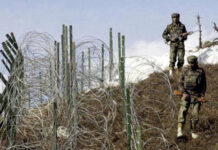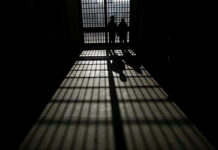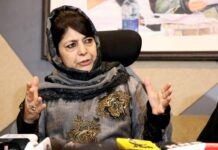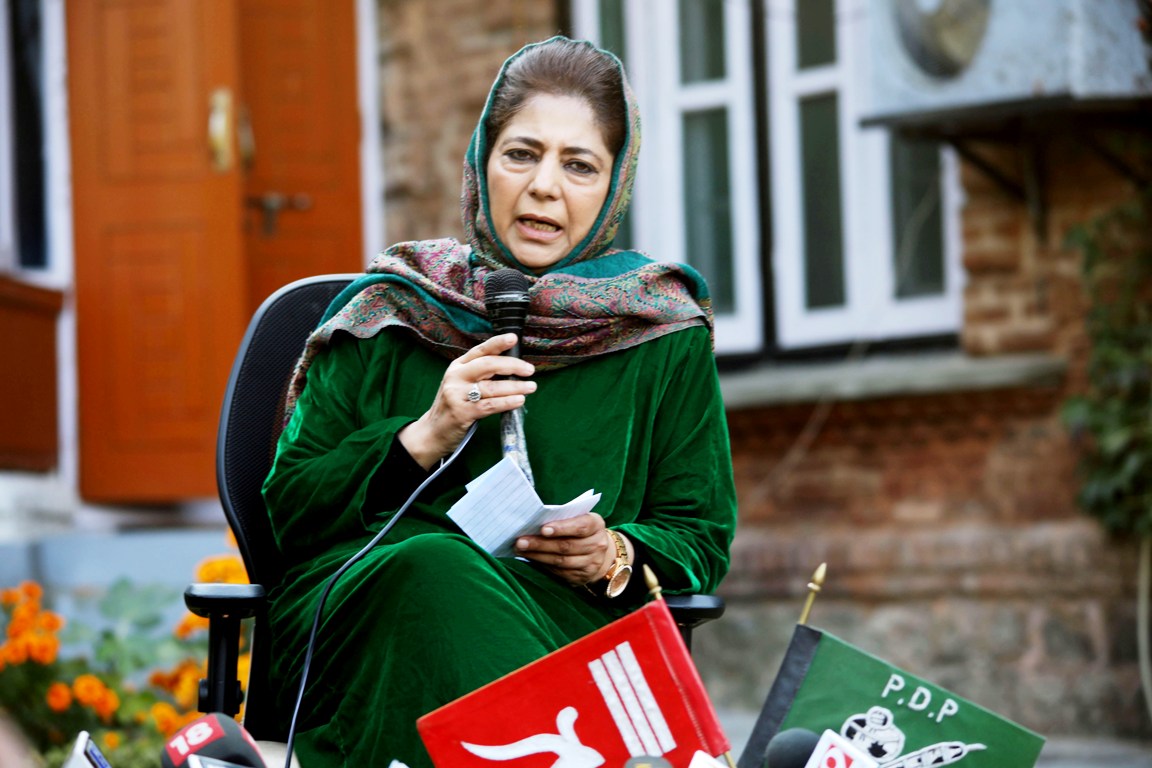SRINAGAR: Chief Justice of India, Justice N V Ramana linked peace with the recognition and protection of the peoples’ dignity and rights. He was speaking to a gathering after laying the foundation stone of the new High Court premises in Srinagar.
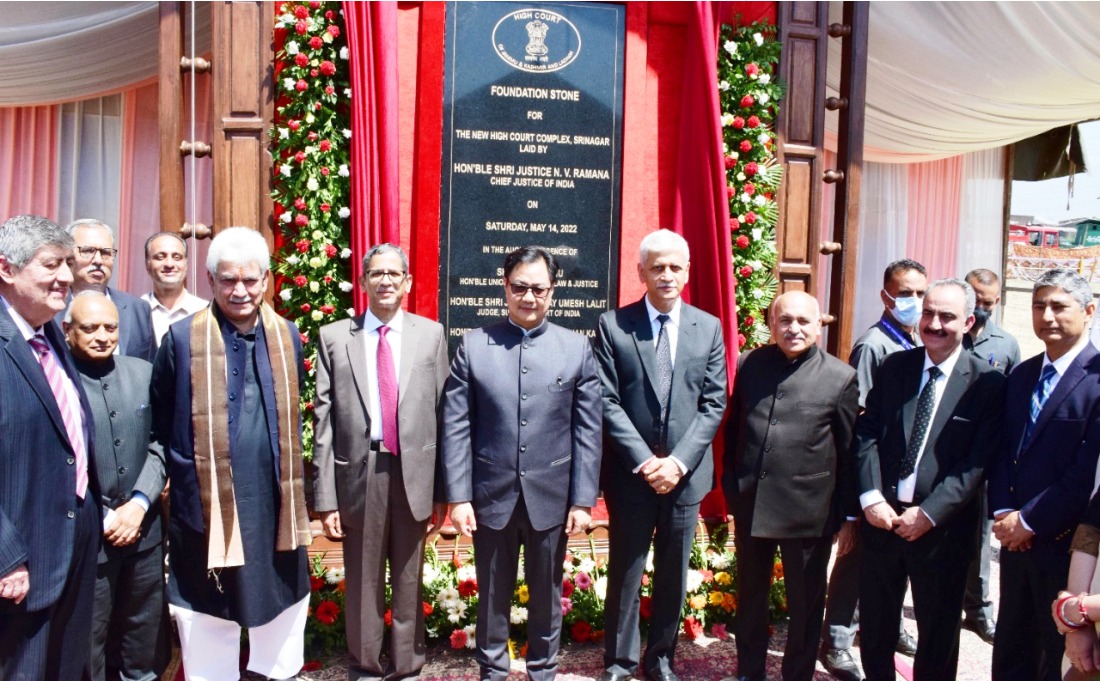
“For the functioning of a healthy democracy, it is imperative that the people feel that their rights and dignity are protected and recognised. Expeditious adjudication of disputes is the hallmark of a healthy democracy. Denial of justice would ultimately lead to anarchy. Soon the institution of judiciary would be destabilized as people will look for extrajudicial mechanisms,” Justice Ramana said. “Peace shall only prevail, when people’s dignity and rights are recognized and protected.”
Justice Ramana said the justice delivery mechanism in India is very “complex and expensive” and the country is far behind in making courts inclusive and accessible. In India, he said, the courts have the constitutional duty of adjudication of rights and upholding the aspirations of the Constitution.
“One of the major challenges to the protection of rule of law and human rights is the inability of the formal justice system to deliver speedy and affordable justice to all. The justice delivery mechanism in India is very complex and expensive,” he said.
Justice Ramana said that the judiciary must be innovative and ensure that the challenges to its working are met with just and constitutional measures. “Technology has been a strong aid to the judiciary. Now, virtual courts are bridging the gaps of accessibility by reducing time, cost and distance. But in a country like India, where a vast digital divide still exists, much needs to be done in order to harness the full potential of technological innovations,” he said.
Quoting poet Raja Basu, Justice Ramana said Jammu and Kashmir is the confluence of Hinduism, Buddhism and Islam and its plurality should be sustained.
“As poet Raja Basu, an admirer of Kashmir observed, Jammu and Kashmir is the confluence of three great religions – Hinduism, Buddhism and Islam. It is this confluence which is at the heart of our plurality which needs to be sustained and cherished,” he said.
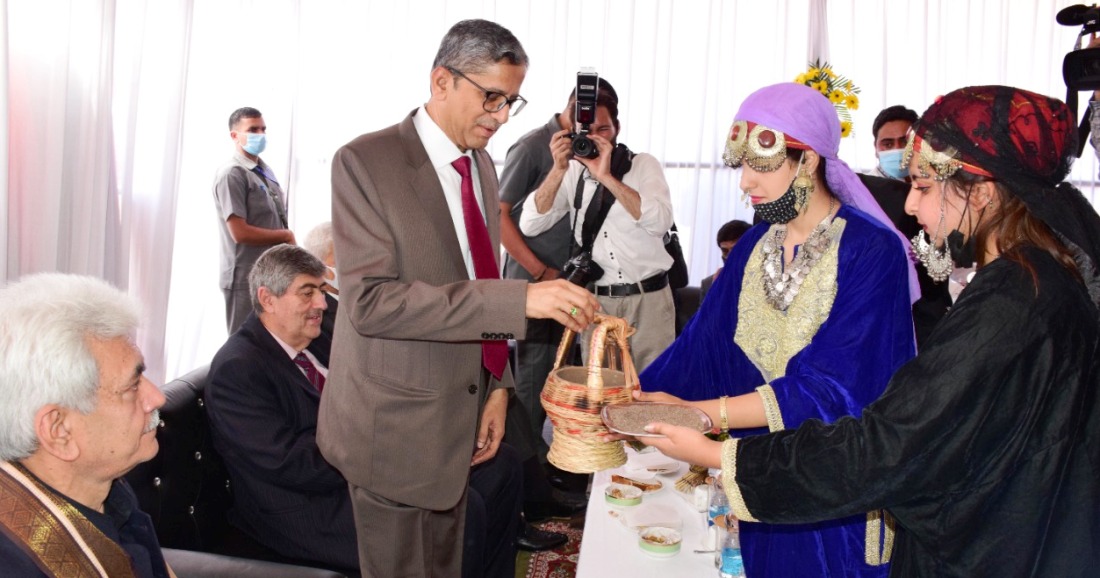
Read the entire speech of Justice Ramana:
“Muddaton baad jo aayaa hoon is vaadi mein
Ik naya husn, naya rang nazar aata hai
(I have come to this valley after ages.
I can see a new beauty, new colour)
These famous words of Poet Ali Jawad Zaidi reflect my sentiments. I had the fortune to visit this paradise many times, but every time I have been amazed by its beauty and moved by its hospitality. It’s a land where one gets to experience four seasons. The kindness of the people here, and the enriching culture of Kashmir, transforms every soul that visits this scenic land.
The soils of Kashmir are home to the world’s best saffron, red chillies, apples and walnut. Kashmiri artisans are known all over the world for their crafts and textiles.
The balance maintained between traditional craftmanship, and contemporary designs, has created a worldwide market for these products. This global acknowledgement of the ancient art form is a nod to the multiple influences, the craftsmen had throughout history. The heart of Kashmir, is the heart of its people!
As yet another famous Urdu poet Rifat Sarfarosh said:
Yeh khitaye kashmir hai
Jannat ki ik tasweer
Insaniyat ki dastaan
Har zarre mein tehreer
(This is Kashmir, an image of heaven
Every particle of this land tells the story of humanity.)
As poet Raja Basu, an admirer of Kashmir observed, Jammu and Kashmir is the confluence of three great religions – Hinduism, Buddhism and Islam. It is this confluence which is at the heart of our plurality which needs to be sustained and cherished.
Unfortunately, wealth creation is not commensurate with the true potential of this beautiful region with invaluable and highly skilled human resources. This situation needs to change, for this land’s brightest future.
This land has produced many eminent jurists and judges. Among them were two former Chief Justices of India, Shri Justice A.S. Anand and Shri Justice T. S. Thakur, and 9 Judges who adorned the Bench of the Supreme Court. The 10th one, Brother Justice Kaul is on the dais with us.
For the functioning of a healthy democracy, it is imperative that the people feel that their rights and dignity are protected and recognised. Expeditious adjudication of disputes is the hallmark of a healthy democracy. Denial of justice would ultimately lead to anarchy. Soon the institution of judiciary would be destabilized as people will look for extrajudicial mechanisms.
Peace shall only prevail, when people’s dignity and rights are recognized and protected.
In our country, Courts have the constitutional duty of adjudication of rights and upholding the aspirations of our Constitution. One of the major challenges to the protection of rule of law and human rights is the inability of the formal justice system to deliver speedy and affordable justice to all. The justice delivery mechanism in India is very complex and expensive.
The judiciary must be at its innovative best to ensure that the challenges to its working are met with just and Constitutional measures. Technology has been a strong aid to the judiciary. Now, virtual courts are bridging the gaps of accessibility by reducing time, cost and distance. But in a country like India, where a vast digital divide still exists, much needs to be done in order to harness the full potential of technological innovations.
Today, I am extremely glad to be laying the foundation stone of the New High Court Complex, here in Srinagar. Solving the problems of infrastructure is very close to my heart. I have consistently emphasized the need for development and modernization of infrastructure. Sadly, post-independence, judicial infrastructure has not been over-hauled to meet the demands of growing needs of modern India.
We are far behind in making our Courts inclusive and accessible. If we don’t attend to this urgently, the Constitutional ideal of access to justice would stand defeated.
The District judiciary is the foundation of the judiciary. Only if the foundation is strong, the entire system can flourish. As I have mentioned earlier, the condition of judicial infrastructure across the country is far from satisfactory. Courts are operating from rented accommodations and under deplorable conditions.
Now, you have the advantage of 100% funding by the Central Government. You all should work in a coordinated manner to fill the gaps.
The other aspect which I keep on highlighting, is the need to fill up the vacancies. 22% of the posts in the district judiciary are still lying vacant. Steps have to be initiated immediately to fill this gap.
Appropriate steps are also required to be taken for providing security and accommodation for all the Judges.
Today is an occasion of joy for the Bench, as well as the Bar. Judges and lawyers must take an oath to work hard to make justice a reality.
Mere laws are not enough to build tradition in a country. It requires men of indelible character inspired by high ideals to infuse life and spirit in the skeleton of the laws.
Dear Judges and judicial officers, you play a very significant role in our Constitutional scheme. The common man always considered the judiciary as the ultimate guardian of rights and liberties.
Your swift, proactive and sensitive decision can make lot of difference in the lives of several people who are in desperate need of justice. Create a congenial environment for the litigants. Often, litigants are under a lot of psychological stress. Litigants may be illiterate, unaware of law and have various financial issues. You should try to make them feel at ease.
I would especially urge the District Judiciary to always keep this in mind. You are at the grassroot level, and are the first contact for the justice seeker with the judicial system. You have a direct link with the people. You must persuade parties to choose ADR mechanisms whenever possible. This will not only help the parties, but also will help in reduction of pendency. Our National and State Legal Services
Authorities are active in the field. You must make best use of the same to reach out to the needy.
Now, I would like to address the members of the Bar. A vigilant Bar is a great asset to the judiciary. To succeed in their endeavours, lawyers must ensure that professional standards are maintained, and legal ethics do not take a back seat. There cannot be a good judgement without the assistance of the advocate. The relationship between the Bench and the Bar plays an important role in the process of dispensation of justice. I am sure that you will be able to make use of this new structure, to shape the future of this great land.
In that light, I hope that the New Court premises, spread around 1.7 lakh square meters, with an estimated cost of Rs. 310 crores having all modern facilities and amenities, becomes the new norm for construction of future court buildings. I am happy to note that the culture and architecture of this land find reflection in the proposed project. I congratulate the architect Mr. G S Chouhan for designing the new building. Justice Geeta Mittal, Justice Rajesh Bindal and Justice Magre have really worked hard to make this happen. I compliment each one of them. I truly believe that this Court complex will cater to bringing about an era of access to justice. As Churchill once said, “We shape our buildings; thereafter they shape us”.
Although the persons who will occupy this building would be the members of the Bar, the Bench and their support staff, we must not forget that the focal point of any justice delivery system is the “litigant, who is the justice seeker”. I am confident that this will be the guiding factor for all of us.
I am glad to again be sharing the dais with Shri Kiren Rijiju, the Union Law Minister. His enthusiasm and commitment to the cause of justice is reflected in the frequency of our meetings over the past few months.
Brother Justice U. U. Lalit under whose dynamic leadership, the legal services authorities are aiming to reach every single person of the country. I have learnt that he is actively monitoring the status of the ongoing Awareness Campaign in Jammu, Kashmir and Ladakh and continuously guiding and motivating the workforce.
Brother Justice Sanjay Kishan Kaul is a son of the soil. He is extremely proud of his heritage and traditions. He is known for his legal acumen, administrative skills and firmness. He strongly believes in the independence of the judiciary, in letter and spirit. He is very aware of the burden of vacancies and the need for making timely judicial appointments. He enjoys immense popularity in the entire legal fraternity.
I appreciate the efforts of the Lieutenant Governors for extending a helping hand for the cause of judiciary.
In the recently concluded Chief Justices and Chief Ministers Conference, Shri Manoj Sinha indicated that he would extend all assistance to the judiciary.
Shri R.K. Mathur also has been very supportive of strengthening the district judiciary. I thank them.
I would also like to congratulate the hardworking Chief Justice of the High Court of Jammu and Kashmir and Ladakh, Justice Pankaj Mithal. I am sure, with your energy and dedication, you will be able to take this High Court to new heights. I thank, the brother and sister judges for organising this event.
I would like to place on record my appreciation for the active help and assistance being extended by the Government of India for these projects. I take organisers for providing me with this opportunity to lay the foundation of new High Court building complex.”



